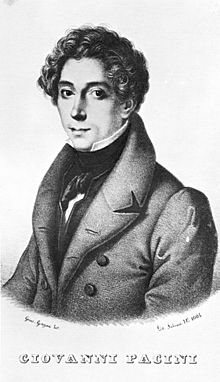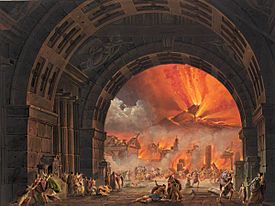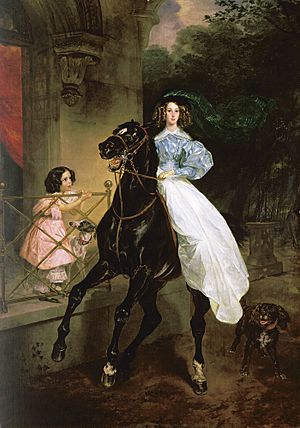Giovanni Pacini facts for kids
Giovanni Pacini (born February 11, 1796 – died December 6, 1867) was a famous Italian composer. He is best known for writing many operas. Pacini was born in Catania, Sicily. His father, Luigi Pacini, was an actor who performed in many of Giovanni's operas. His family originally came from Tuscany.
When Giovanni Pacini started writing operas, another great composer named Gioachino Rossini was very popular in Italy. Pacini wrote about 25 operas during this time. He later admitted in his Memoirs (his life story) that these early operas were "rather superficial," meaning they weren't very deep. For a while, he was the director of the Teatro San Carlo in Naples, a famous opera house.
Later, Pacini stopped composing for five years and opened a music school in Viareggio. During this time, he thought a lot about Italian opera and wrote down his ideas. Like another composer, Saverio Mercadante, Pacini changed his style. However, he soon became less famous because Giuseppe Verdi started to become very popular. Many of Pacini's later operas seemed old-fashioned and were rarely performed outside Italy. Today, most of Pacini's work is forgotten, though some recordings exist.
Pacini's Music Career
Giovanni Pacini wrote about 74 operas during his lifetime. Earlier, people thought he wrote more, but it turned out some were just different names for the same works. People said he didn't focus much on the music's harmony or how the instruments played together. Rossini even joked, "God help us if he knew music. No one could resist him!" Pacini himself knew how popular Rossini was. He wrote, "Everyone followed the same school, the same fashions... If I was a follower of the great man from Pesaro, so was everyone else."
After Rossini moved to Paris in 1824, Pacini and other composers like Vincenzo Bellini and Gaetano Donizetti began to change Italian opera. They made the orchestra play a bigger role, and singers used less fancy vocal tricks (called coloratura). More focus was put on strong emotions and dramatic stories. For example, heroes in operas were now often sung by tenors, while villains were sung by basses. The drama in the stories became much more important.
Pacini played a key part in these changes. He and another composer, Nicola Vaccai, influenced Bellini more than many people realize. This became clear when two operas from 1825 were brought back: Vaccai's Giulietta e Romeo and Pacini's L'ultimo giorno di Pompei.
Some of Pacini's lighter operas, like Il Barone di Dolsheim and La schiava in Bagdad (written between 1818 and 1820), made him one of Italy's top composers. His fame grew even more with operas like Alessandro nelle Indie (1824) and the popular L'Ultimo giorno di Pompei (1825).
In Alessandro nelle Indie, the main character, Alessandro, was first sung by a tenor with a deep voice. But later, a tenor with a lighter voice sang the role, showing Pacini was trying new things. His opera Arabi nelle Gallie (1827) was performed in many important theaters around the world, including the United States for the first time. It was very popular in Italy. For a while, Pacini was Rossini's biggest competitor in Italy during the 1820s, even more so than Donizetti or Bellini.
Many of Pacini's operas from this time are now almost forgotten. However, Il corsaro (1831) was performed again in 2004, 173 years later! This opera is quite different from Verdi's later opera with the same name.
Later, Bellini and then Donizetti became more famous than Pacini. Some of Pacini's operas, like Carlo di Borgogna (1835), were not successful. Pacini himself realized this, writing in his memoirs, "I began to realize that I must withdraw from the field. Bellini, the divine Bellini, has surpassed me."
However, Pacini started composing again and had his biggest success with Saffo in 1840. After Saffo, Pacini became very popular again. Donizetti had moved to Paris, Bellini had passed away, and Mercadante's biggest successes were behind him. This meant Verdi was Pacini's main competition.
Pacini had more successful operas during this time, including La fidanzata corsa (1842), Maria, regina d'Inghilterra (1843), and Stella di Napoli (1845). One opera, Allan Cameron (1848), is interesting because it tells the story of Charles II of England when he was young, before he became King. But by 1844, Verdi had written famous operas like Nabucco and Ernani, making him even more well-known than Pacini.
After this period, Pacini's fame slowly declined. He had only a few moderate successes like Il saltimbanco (1858).
Pacini passed away in Pescia, Tuscany, in 1867. He created a huge amount of music during his life. With over 70 stage works, he wrote more operas than Rossini (41 operas) or Handel (43 operas). He is remembered as one of the most productive composers in opera history, alongside Donizetti.
Operas
See also
 In Spanish: Giovanni Pacini para niños
In Spanish: Giovanni Pacini para niños
 | Claudette Colvin |
 | Myrlie Evers-Williams |
 | Alberta Odell Jones |




